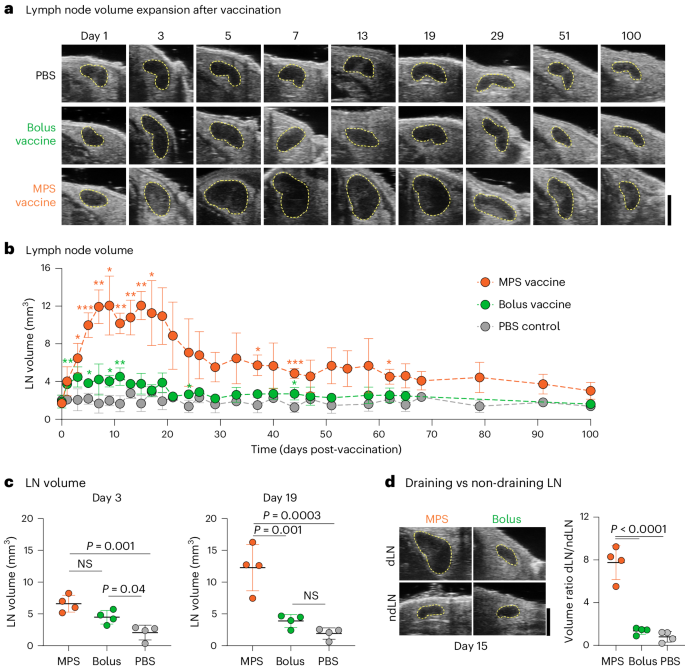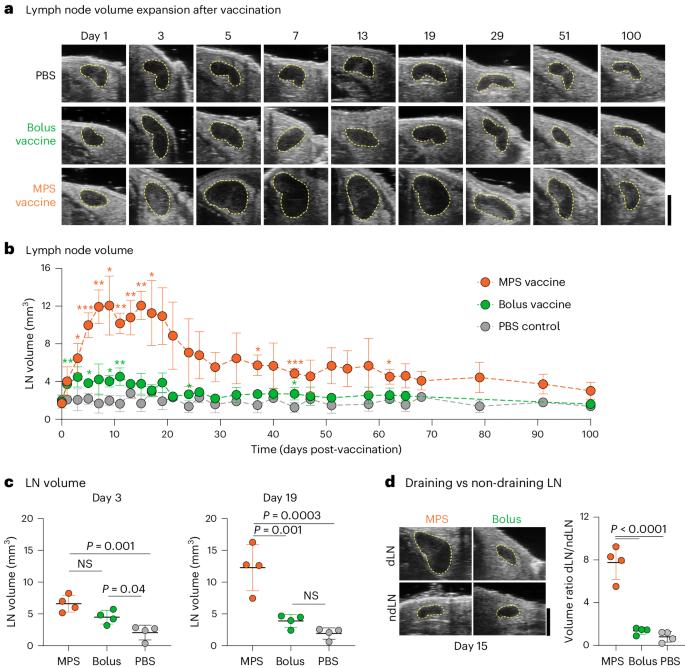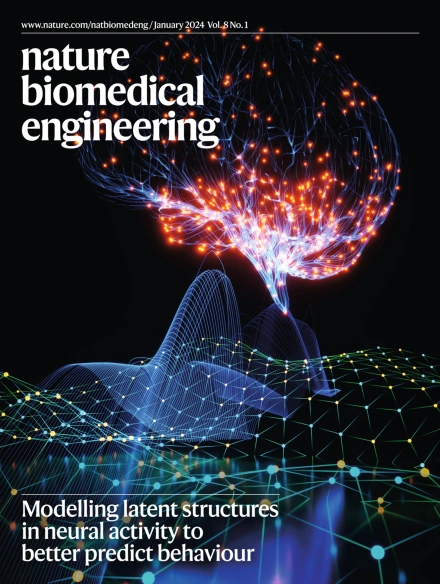淋巴结持久扩张与治疗性疫苗接种的疗效有关
IF 26.8
1区 医学
Q1 ENGINEERING, BIOMEDICAL
引用次数: 0
摘要
免疫接种后,淋巴结会动态扩张和收缩。使淋巴结早期扩张的机械和细胞变化已被描述,但这种反应的持久性及其对适应性免疫和疫苗疗效的影响尚不清楚。在这里,通过利用小鼠淋巴结的高频超声成像,我们报告了在黑色素瘤小鼠模型中,使用含有模型抗原的介孔二氧化硅疫苗免疫的动物比使用栓剂免疫或明矾等标准疫苗制剂免疫的动物的淋巴结扩张更强、更持久,而且在接种疫苗后的 100 天内,持久而强大的淋巴结扩张与疫苗疗效和适应性免疫有关。免疫改变了淋巴结的机械和细胞外基质特性,推动了免疫细胞和基质细胞的抗原依赖性增殖,并改变了树突状细胞和炎性单核细胞的转录特征。强有力地维持淋巴结扩展的策略可能会提高疫苗接种的效果。本文章由计算机程序翻译,如有差异,请以英文原文为准。


Durable lymph-node expansion is associated with the efficacy of therapeutic vaccination
Following immunization, lymph nodes dynamically expand and contract. The mechanical and cellular changes enabling the early-stage expansion of lymph nodes have been characterized, yet the durability of such responses and their implications for adaptive immunity and vaccine efficacy are unknown. Here, by leveraging high-frequency ultrasound imaging of the lymph nodes of mice, we report more potent and persistent lymph-node expansion for animals immunized with a mesoporous silica vaccine incorporating a model antigen than for animals given bolus immunization or standard vaccine formulations such as alum, and that durable and robust lymph-node expansion was associated with vaccine efficacy and adaptive immunity for 100 days post-vaccination in a mouse model of melanoma. Immunization altered the mechanical and extracellular-matrix properties of the lymph nodes, drove antigen-dependent proliferation of immune and stromal cells, and altered the transcriptional features of dendritic cells and inflammatory monocytes. Strategies that robustly maintain lymph-node expansion may result in enhanced vaccination outcomes. Durable and robust lymph-node expansion is associated with the efficacy of therapeutic vaccination, as shown in mice immunized via a biomaterial-based vaccine.
求助全文
通过发布文献求助,成功后即可免费获取论文全文。
去求助
来源期刊

Nature Biomedical Engineering
Medicine-Medicine (miscellaneous)
CiteScore
45.30
自引率
1.10%
发文量
138
期刊介绍:
Nature Biomedical Engineering is an online-only monthly journal that was launched in January 2017. It aims to publish original research, reviews, and commentary focusing on applied biomedicine and health technology. The journal targets a diverse audience, including life scientists who are involved in developing experimental or computational systems and methods to enhance our understanding of human physiology. It also covers biomedical researchers and engineers who are engaged in designing or optimizing therapies, assays, devices, or procedures for diagnosing or treating diseases. Additionally, clinicians, who make use of research outputs to evaluate patient health or administer therapy in various clinical settings and healthcare contexts, are also part of the target audience.
 求助内容:
求助内容: 应助结果提醒方式:
应助结果提醒方式:


